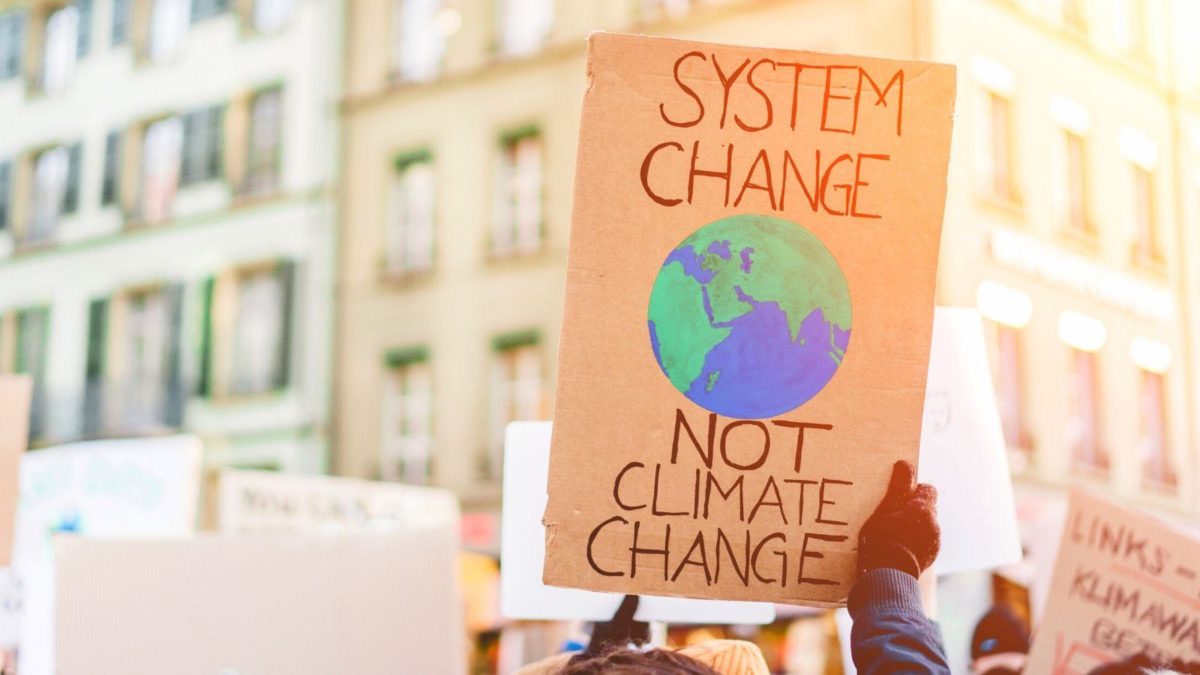Plastics are one of the world’s biggest environmental issues right now. The sheer scale of the problem is staggering and it might seem overwhelming. The volume of plastic bags in circulation is way too high, and in many cases, it is simply unnecessary.
- Over 2 million plastic bags are being used every 60 seconds around the world, and their typical lifespan is only 12 minutes.
- During the typical lifespan of one single plastic bag, 24 million other plastic bags will be used.
- In America alone, 100 billion plastic bags a year are used.
If you want to make a difference, consider picking up trash in the community, choosing reusable alternatives to plastic bags, and ensuring you recycle the plastic you currently have. These are great ways to make a positive change and reduce our global pollution issue.
Table of Contents
Why We Need To Recycle Plastic Bags
Plastic bags end up in all the wrong places. It is partly due to their design, and partly due to our lack of suitable disposal and education.
Plastic grocery bags can blow in the wind for miles without being caught (or even noticed). Furthermore, they can land in the sea and environment. Unfortunately, the bags look very similar to lower food chain marine organisms, like jellyfish. For a turtle or a fish, a bird, whale, the “jellyfish” are just too alluring.
Plastic bags also get tangled in marine flora and fauna. A single plastic bag can suffocate or smother a wide variety of species over time, which makes them one of the most deadly things to ever enter our oceans.
A whale recently (2018) washed up on the shore of Indonesia’s Kapota Island in Wakatobi National Park with 1,000 pieces of plastic in its stomach (80 of which were plastic bags). We simply can’t let this go on. Ideally, we need to say no to plastic, but while they are still in circulation, we all should know how to recycle plastic bags.
Knowing how to recycle plastic bags is not the sole answer to our plastic global issue. It is a piece in the puzzle of which we are collectively trying to solve.
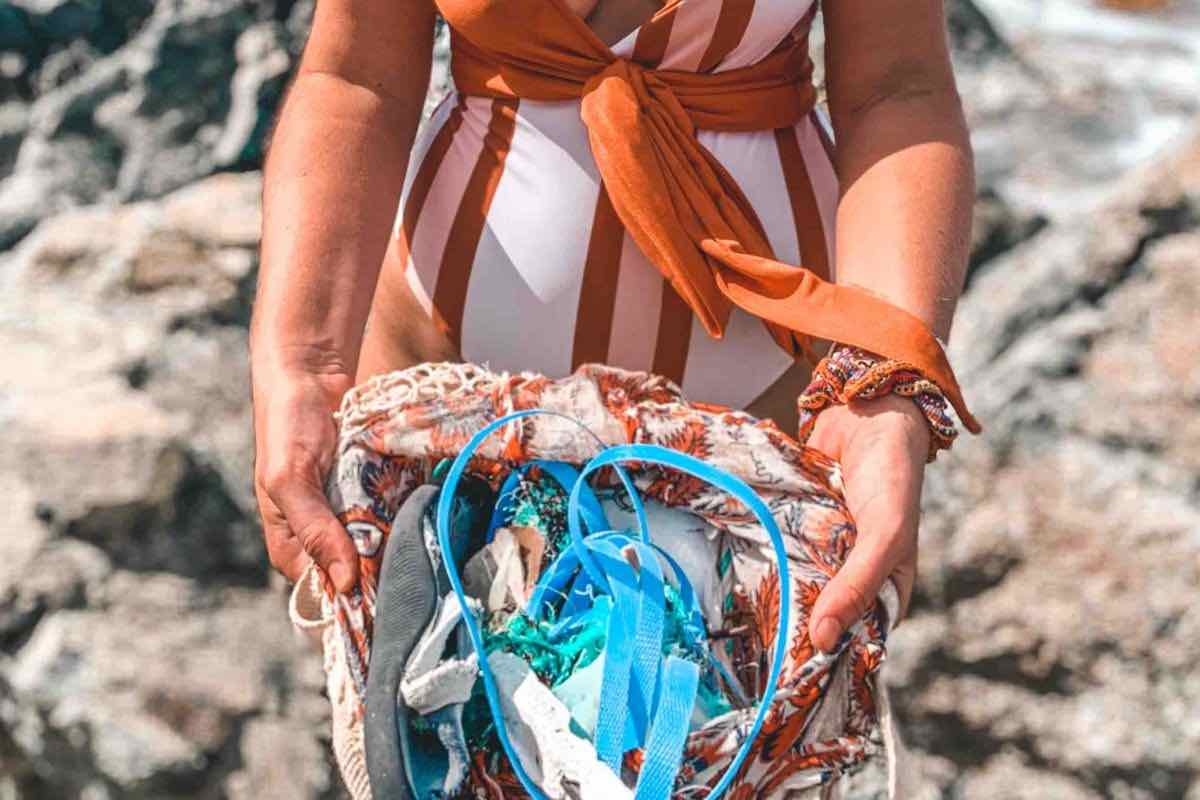
6 R’s of Waste
The concept of the 6 R’s of waste has been around for a long time and plays a vital role in keeping our planet “safe”.
- Refuse | Reduce | Reuse | Recycle | Rot | Remove
Learning how to reduce your waste is critical for the longevity of global health. We do not need plastic for our everyday items, there are great plastic free toothpaste brands, reusable bag options, and zero waste products on the market at affordable prices.
Understanding how to recycle our existing waste is equally important and the fact that you are here means that you understand its value.
We already have the technology.
- Plastic bags can be recycled on large scale.
- They can also be reused/recycled to create products and other plastic bags, reducing the need for adding new plastic into the system.
What is a Plastic Bag?
There are two main types of plastic bags that we encounter in our daily lives:
Plastic #2
- “Checkout Style (grocery)” Bags (High Density Polyethylene -HDPE)
- [To remember: Think about how often they’re used – Often /High frequency – High density.]
Plastic #4
- “Boutique (Clothes Store shopping)” Bags (Low Density Polyethylene -LDPE)
- [To remember: Think about how often they’re used. Less often/Low frequency – Low density]
Which plastics can be recycled?
The recycling process is more complicated than we are led to believe. That’s why knowing exactly how to recycle plastic bags is so important.
Not all kinds of plastic can be recycled together. There are 7 main types of commercially used plastic and they each have their own number and need to be sorted together in order for the recycling process to be effective (as some types cannot be recycled at all).
What do the 7 numbers inside the recycle triangles mean?
The number in the triangle identifies the type of plastic a container is made from, not whether or not it is recyclable.
- 1 – PET (Polyethylene Terephthalate)
- 2 – HDPE (High-Density Polyethylene) – “Checkout style” plastic bag
- 3 – PVC (Polyvinyl Chloride)
- 4 – LDPE (Low-Density Polyethylene) – “Boutique” plastic bag
- 5 – PP (Polypropylene)
- 6 – PS (Polystyrene)#7 — Other (BPA, Polycarbonate and LEXAN)

Both #2 & #4 can be recycled at collection bins. But in most cases, they need to be separated from things like coffee container lids and put in their own recycle bin.
Other Types of “Plastic Bags” that can be recycled at collection bins (Recycle Coach):
- plastic shopping bags (from any store — remove receipts, etc.)
- food packaging (Ziploc-type bags)
- bread bags
- plastic liners from cereal boxes (do not include if they tear like paper)
- produce bags
- dry cleaning bags (remove staples, receipts, hangars)
- plastic newspaper wrapping
- product wrapping (such as covers a case of water bottles, etc.)
- bubble wrap and air pillows (popped)
- plastic shipping envelopes (remove labeling)
Can Plastic Bags Go Into Your Curbside Recycling Bin?
Every community and curbside recycling program is slightly different. In general, plastic bags should not go into your curbside recycle bin.
These need to be placed in specialised collection locations that accept plastic bags (many of them are inside major shopping malls/grocery stores) so that they can be recycled.
Note that different collection bins will take different types of plastic, depending on what they can do with it. For example, the REDcycle collection bins (in Australia) will take plastic bags (type #2, #4 & #5) which can be turned into usable products by companies like Replas.
Country-specific recycling details can be found in the “Where to recycle plastic bags” section. This is essential in knowing how to recycle plastic bags.
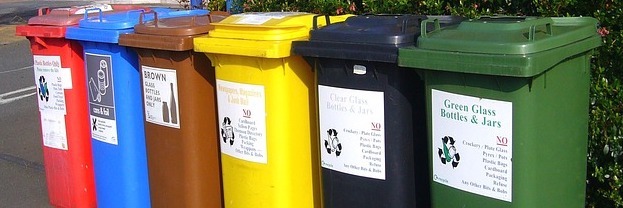
Where To Recycle Plastic Bags
While people are slowly using less and less plastic bags, there may be times where using one is necessary. In which case, you’re going to want to recycle it, if possible.
Depending where you are in the world, will depend on how exactly you can go about the recycling process. Part of eco travel, is being aware and making conscious decisions. This guide will help facilitate that.
Each community, neighbourhood, country, etc. have their own ways to accept plastic bags for recycling.
The compiled list below is a summary of how to recycle plastic bags in various places around the world. However, it will be beneficial to do your own research and find out if there are any easier/closer locations for you to recycle at.
Companies collecting plastic bags for recycling
Check your recycling location finder to find a store near you. Otherwise, here are some companies that have plastic bag recycling bins that you might not have thought about.
- Publix
- Target
- Shoprite
- Coles
- Woolworths
- Kroger
- Tesco
- Morrisons
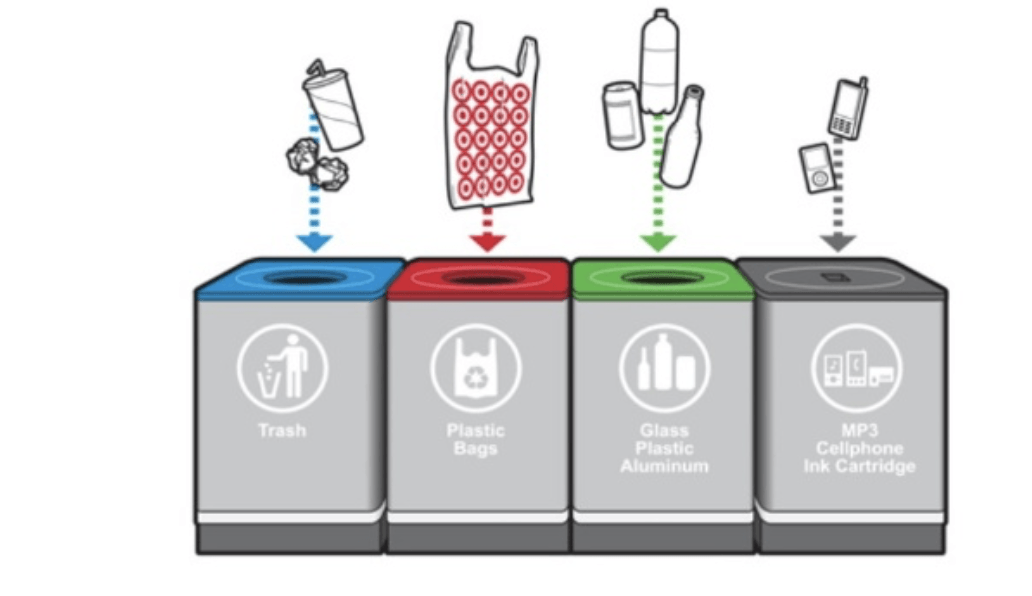
Where To Recycle Plastic Bags In North America
Each state (and even city) in North America have different laws that govern how plastic bags should be recycled. As an example, some of the city/state specifics have been highlighted below.
How to recycle plastic bags near me (USA)
Earth 911 has a search by postcode platform to recycle just about anything.
How to recycle plastic bags in NYC
The NYC “State law requires retailers with more than 10,000 square feet of retail space or those who are part of a chain with more than five stores (each with more than 5,000 square feet of retail space) to provide bins for the collection of used plastic carryout bags. These retailers must also recycle the returned bags and keep records for three years describing the amount of plastic bags collected and recycled.” The law requires that stores collect film plastic (materials must be CLEAN and dry).
Plastic bags accepted at NYC recycle bins (chain retail stores with more than 5 stores)
- Grocery bags
- Retail bags with string ties removed
- Newspaper bags
- Dry-cleaning bags
- Produce bags with ALL food residue removed
- Bread bags with ALL food residue removed
- Cereal bags with ALL food residue removed
- Plastic wrap from paper products (paper towels, toilet paper, etc)
- Stretch/shrink wrap with all food residue removed
- Zipper type bags
Plastic bags not accepted in NYC recycle collection bins
- Bags with strings
- Bags with food residue
- Soil or mulch bags
- Food containers
- Bottles
How to recycle plastic bags in Chicago
“Plastic wrap, film, and bags, are not recyclable at curbside but can be recycled at most grocery stores.” Check out this great list of all things recycled in Chicago to find where and how to recycle near you.“
How to recycle plastic bags in California
California by law has implemented an “At Store Recycling Program”.
Plastic bag recycling drop-off bins at ALL regulated supermarkets and large retail stores with a pharmacy. The collection bins should be easily accessible to the public. Through the program, the bins are tracked to ensure recycling of the bags takes place.
How to Recycle Plastic Bags in the UK
Plastic bags generally can not be placed in your curbside bin. Therefore will need to be dropped at a suitable location. In the UK most supermarkets have plastic bag collection bins, these include:
- Asda
- Morrisons
- Sainsbury’s
- Tesco
- The Co-operative
- Waitrose
Alternatively, you can find out where to recycle plastic bags in the UK using your postcode.
How To Recycle Plastic Bags In Australia
Plastic bags cannot be placed into your kerbside bins in Australia. They need to be dropped at a collection bin. Most large chain supermarkets like Woolworths, Coles, and Foodworks have these.
What happens when you recycle plastic bags?
Plastic bags can be melted down and turned into plastic again, which can then be manipulated into any shape or form (in many cases, another plastic bag).
But, in order to recycle the plastic, the bags must be clean of contaminants (paper, food, dirt, waste, etc), it’s a big process. This requires a lot of energy and resources. It seems like a roundabout exercise, but until reusable bags become the mainstream, recycling plastic bags is better than introducing new volumes of plastic into circulation.
Currently, the amount of plastic bags that are recycled is very low:
- In Australia – only 3% of plastic bags are actually recycled.
- In the USA – only 1% of plastic bags are actually recycled.
Perhaps if more people knew how to recycle plastic bags, these percentages could come up significantly.
The Recycling Process
Each recycling plant may differ, but, the general process in which plastic bags are recycled includes the following:
- Plastic bags are brought (from various locations & recycling bins) to a centralized holding warehouse
- The bags run along a conveyor belt where contaminates are removed (by hand & machines with magnets, in “float tanks”. Items inside the bags [paper, food, etc] are removed)
- After the sorting stage, plastic bags are melted and formed into a plastic “paste”
- The plastic “paste” is dried and broken into tiny pellets
- Pellets are sorted by size and stored for later use
- These pellets can be re-melted and used to make new plastic bags
Can Green Grocery Bags Be Recycled?
They can. But this depends on where you live.
For example, in Australia, these green reusable bags are actually shipped to China to be recycled. The bag material itself can be recycled, but the stitching used in the bag cannot. It is a labor-intensive job to remove the stitching, and therefore the costs of this process are very high in Australia (where wages are high).
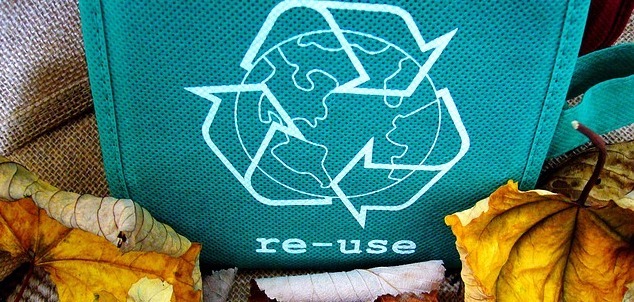
Can Degradable Or Compostable Plastic Bags Be Recycled?
Are biodegradable and compostable bags good? Bad? Environmentally friendly? We need to know how to recycle all plastic bags (if possible).
Degradable bags
“Degradable bags are made from petroleum products that contain metal compounds to help accelerate their breakdown. Oxygen, ultra-violet light, and/or heat, chemically weaken degradable plastic bags until they become brittle and fragment into smaller pieces.”
Planet Ark
In a nutshell: Steer clear from using these as your bin bag and do not put these in your curbside recycling bin. These bags break down into hundreds of tiny pieces of plastic, that animals, or us, can consume. They also can’t be composted.
Biodegradable bags
The word biodegradation is not clearly defined. This is why it gets used frequently and with a lot of confusion. Essentially, everything has the potential to biodegrade, even if it takes millions of years.
Biodegradable trash bags can be made from a range of materials, however, corn and wheat starch when making “plant based plastic”. In presence of oxygen and high temperature, these bags will degrade, however in a landfill (an anaerobic environment with no oxygen), the bags cannot biodegrade.
In a nutshell: These are better than degradable bags, however still not good enough. Be mindful that when these bags end up in the landfill, they will have difficulty decomposing or “biodegrading”.
Compostable bags
These bags are generally biodegradable bags that meet an industry standard that is also government approved. They can biodegrade within six months in a commercial compost facility (or if composted in the right conditions).
In a nutshell: If you really need a bin liner, these are the better choice (over traditional single-use plastic bags). They will still have difficulty decomposing in a landfill. When considering these bags as a replacement, make sure that it is certified as compostable.
There still are better alternatives to plastic bags. We really want to say no plastic bags in general.
What Can Plastic Bags Be Recycled into?
There are a few companies around the world that turn plastic bags into usable plastic. The technology is available.
Hilex Poly
Hilex Poly received an award for its innovative “Bag 2 Bag” recycling program, a plastic bag and films recycling infrastructure that makes it easier for consumers to recycle used plastic bags, wraps, and films.
They have more than 30,000 plastic bag (wrappers, plastic film recycling) collection bins in the USA. They can recycle over 20million pounds (9 million kilograms) of plastic bags, snack packets and wraps in a year.
Plastic can be turned into a variety of products, however, the recreation of plastic bags has several benefits. “Compared to conventional bags, the “Bag 2 Bag” bags made of recycled content require 20 percent less energy to produce, lowers carbon emissions by 11 percent, diverts millions of pounds from landfills each year, and provides sustainability conscious consumers a closed-loop carryout package”.
Recycled plastic bags to products
There are many different companies around the world making products out of recycled plastic. Once the plastic in cleaned, sorted, and melted down, it can really be used to make any kind of product.
Here is a list of some of the products that Replas is making out of recycled plastic.
- Bollards (fence posts)
- Decking
- Fencing
- Panels (timber replacement)
- Furniture
- Gardening beds
- Signage / Traffic Control
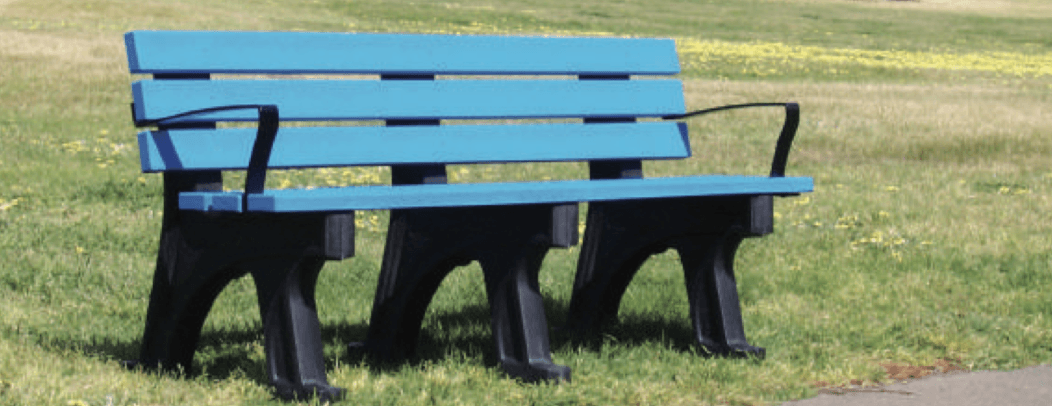
Is There A Benefit To Creating Products Out Of Recycled Plastic?
In a lot of the products mentioned above, the real benefit (apart from letting used plastic go to waste in a landfill or end up polluting the environment) is that plastic can be used as a timber replacement.
Additional benefits of recycled plastic being used over timber products include:
- Less trees need to be cut down in order to make timber
- Plastic does not rot/ or warp like timber
- There is no need for poisonous termite treatment on plastic
- Plastic panels can be made to look like wood (wood grain patterns)
How to recycle plastic bags at home
You can get creative with plastic bags at home, turning them into usable material or even decoration. Here are ideas on how to recycle plastic bags into something practical or “arty”.
Make plastic sheets for use in craft projects
- Clean the plastic bags
- Cut/trim them into usable size (create flat sheets)
- Melt the plastic (in this case lay plastic sheets onto of each other)
- Heat weld the sheets together to make a thick sheet of plastic (use baking paper on either side of the sheets of plastic & a clothing iron to heat)
- In this case 64 bags can be melted together to create a sheet of plastic 0.1 inches thick (2.5mm)
Here is a video that explains the process
Plastic bag upcycling for your home
Plastic has become as popular as it has because of its design benefits. Its ability to be manipulated into various shapes, be waterproof and lightweight, means that it is ideal for outdoor use. Here are a couple of ideas on how to reuse plastic around your house in a practical way.
- Use the bags to fill pillowcases for outdoor furniture. They won’t soak up water if it rains
- Cover fruit on your trees to deter pests/animals
- Use them as packing material instead of bubble wrap
- Hanging Light Decorations
- DIY Tote Bag
- Recycled Plastic Bag Woven Basket
- Jewelry
- Plant hangers / Planters
Once you realize that the plastic can be manipulated into just about any shape that you can imagine, your possibilities become endless.
Just make sure that you control the plastic bag use so that it does not end up blowing away in the wind.
The Future Of Plastic Bag Recycling
Plastic bag tax
The gradual phase-out of the single use plastic bag has been happening around the world. The additional charges/tax on plastic bags is starting to show positive effect. Ireland reduced their plastic bag use by 90% in one year with the introduction of a 15c bag tax.
With such a radical drop in the volume of plastic bags used, it could mean that recycling might have a chance to catch up (until alternatives become mainstream).
This would eliminate the need to create new plastic bags at all.
Plastic bag bans
Bans on the supply of single use plastic bags are catching on around the world. This is having a huge effect to the mindset of communities and has really brought the issue into the mainstream media.
If no more plastic bags were produced from today. There would still be a staggering amount in circulation. Recycling these into other products (large-scale, such as furniture or decking (for homes or commercial space) will prevent these bags from entering the environment.
Be aware on your eco travels where in the world the plastic bag is in use.
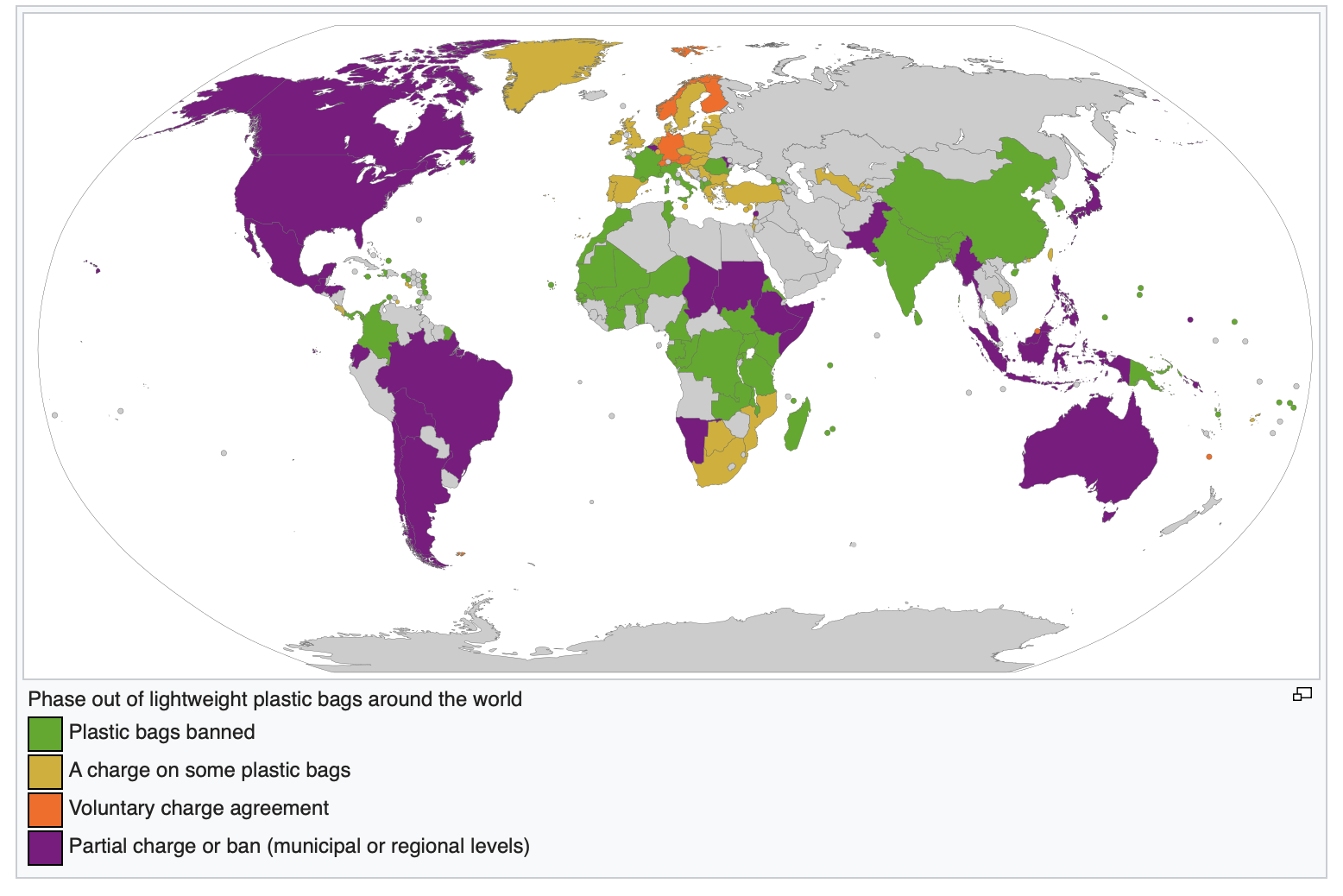
Plastic bags into food
One day soon we could be eating our old plastic bags thanks to the help of fungi.
Schizophyllum is a tiny mushroom that actually breaks down plastic. It is also edible. The Fungi Mutarium (Utrecht University) has developed a prototype to successfully break down plastic bags into an edible mushroom. Apparently, it tastes like a regular mushroom.
There is still some testing that needs to be done on the actual health benefits of eating the mushroom. However, the process has set a new baseline for the successful breakdown of plastic bags.
With the mushroom being readily available, it could be used to mass break down landfill-sized plastic bag collections.
Alternatives To Plastic Bags
Recycling plastic bags is a great step in the right direction towards improving the world’s plastic pollution issues. It is however, only part of the solution.
Alternatives to plastic bags (and all single use plastic) are really the key to moving forward. Let’s say no to plastic! With more and more alternatives being developed and becoming commercially available, the time to make the switch has never been more important.
How To Recycle Plastic Bags In Summary
- Plastic bags CAN BE RECYCLED!
- They can be cleaned and turned back into plastic for more bags/or other products
- In most cases plastic bags CAN NOT be recycled in your curbside bin
- There are dedicated collection bins (at most large supermarket chains)
- Getting creative with plastic bags around your home can mean money saving
- Avoid lining your bins with plastic bags, there are many great alternatives
- The future of plastic bag recycling may mean breaking down the plastic with mushrooms for us/other animals to eat.
- Learn how to eco shop to avoid the need for plastic bags altogether.
Where to find and share ideas on the future of sustainability
Looking for the latest and up-to-date ideas from around the world on the sustainability movement? Got some ideas worth sharing?
Pinterest has become a hotspot for peer-to-peer sharing online. Set out in an easy-to-use, visually appealing way, there are new ideas popping up daily on all thing sustainable.
Even better, join a Pinterest Eco & Sustainable Group Board. That way you can keep up to date and share your ideas with like-minded people anywhere in the world.
Like This Article? Pin it!
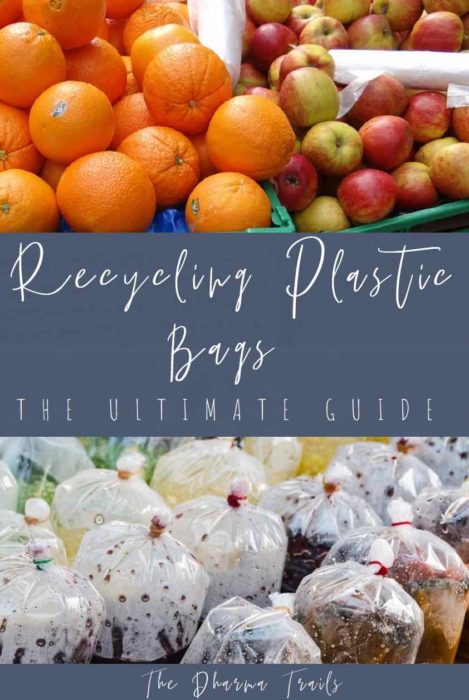
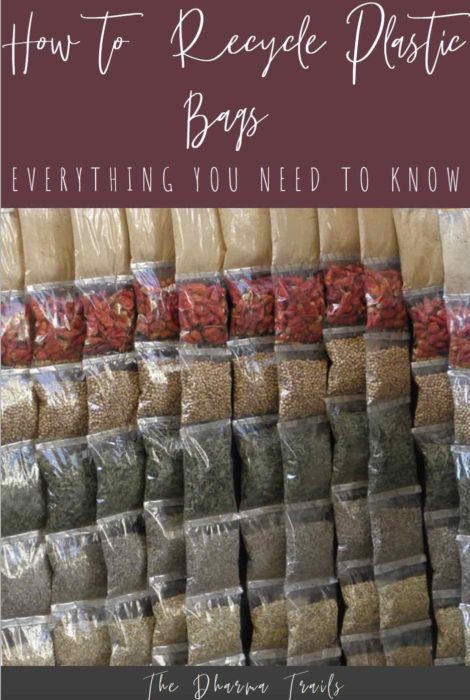
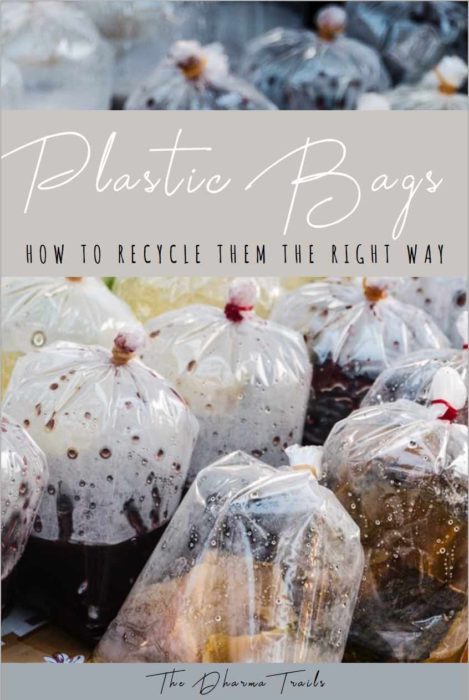

Aaron is one of the co-founders of The Dharma Trails. His background in marine eco tourism and writing have blended together to create the eco travel platform read by users around the world.

